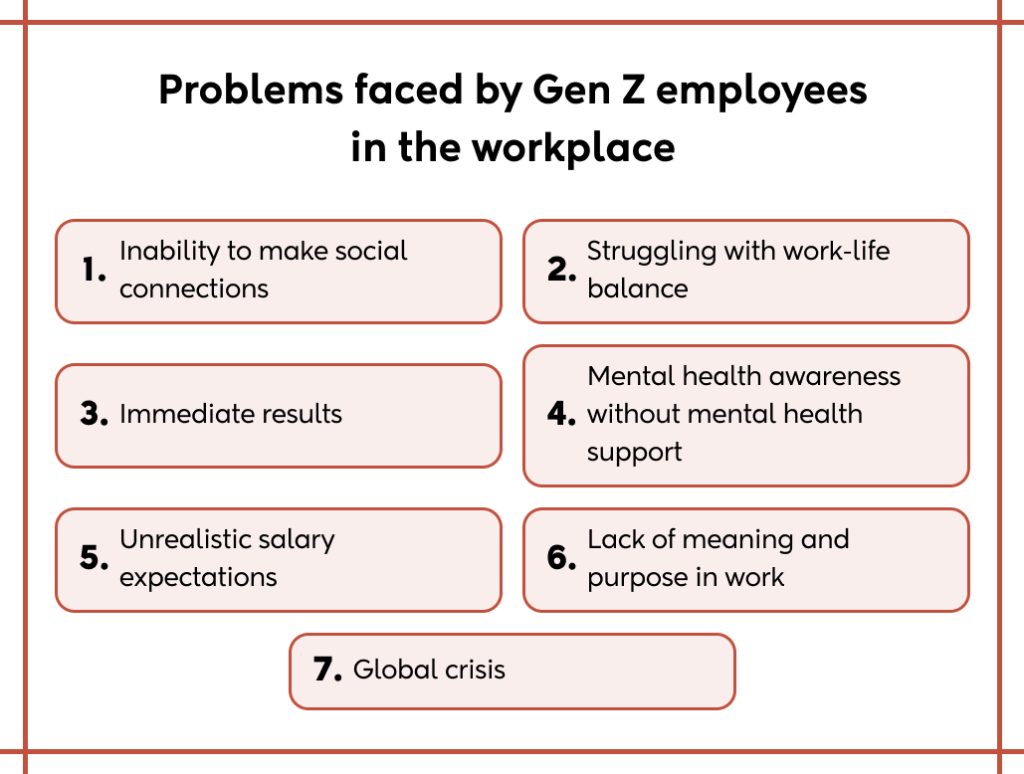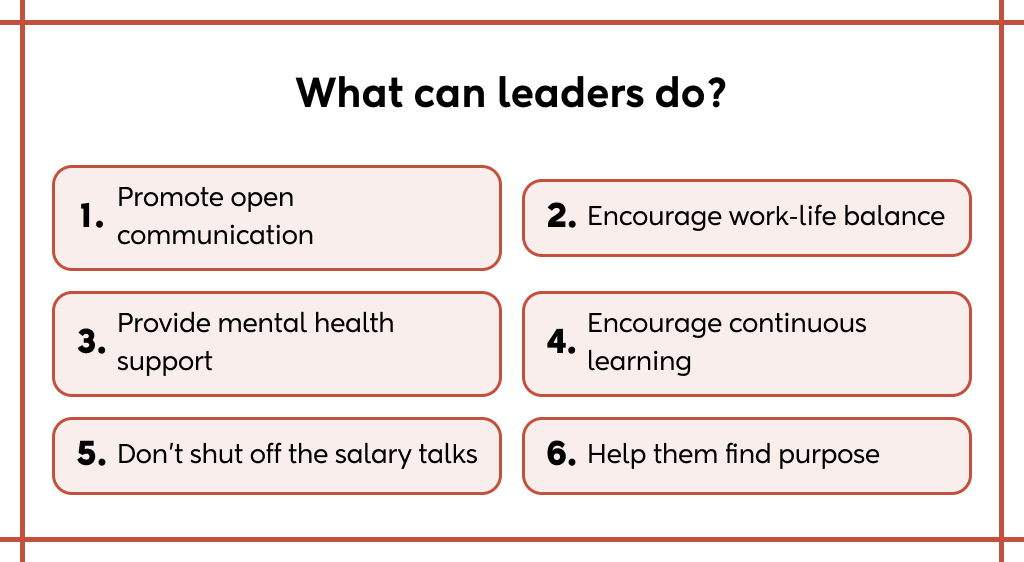Gen Z– those born between the mid-to-late 1990s and early 2010s grew up in a world shaped by rapid technology, constant connectivity, and global uncertainty. They are digital natives, socially aware, and vocal about their mental health.
As per Deloitte’s Gen Z and Millennial Survey 2022, it was revealed that the two generations are striving for balance and advocating for change. It was found that 46% of Gen Z employees feel stressed and anxious most of the time at work.
This is higher than any other generation working, and it is not just about age and inexperience. It is more about the unsuitable workplace structure due to the generation’s needs.
Unlike previous generations, Gen Z entered the workforce during a time marked by a pandemic, climate anxiety, and economic instability. These unique circumstances have shaped their expectations – and their challenges.
This presents a real opportunity for leaders to create a safe workplace culture for themselves. This article will help you understand what things make Gen Z feel stressed and what leaders can do to resolve them.
Problems faced by Gen Z employees in the workplace

Gen Z employees bring innovation, digital fluency, and a strong sense of purpose to the workplace. But they also face unique challenges that older generations often overlook. They struggle with issues like burnout, communication gaps, and a lack of meaning at work. These stressors aren’t just personal; they’re systemic.
The following are some of the problems that they face in a workplace setting:
- Inability to make social connections
Despite being the most digitally connected generation, Gen Z often struggles with forming meaningful social connections in professional environments. Social media, texting, and digital platforms largely shape their communication style.
This can clash with traditional workplace norms that value face-to-face conversations, spontaneous collaboration, and relational trust-building. These gaps often result in misinterpretations, a lack of rapport, or social isolation, especially in cross-generational teams.
- Struggling with work-life balance
They are constantly connected via emails, messages, and tasks that follow them well beyond working hours, resulting in a blurred boundary between work and life. The shift to hybrid and remote work has only magnified this, often making them feel “active” with little room to disconnect and recharge.
- Immediate results
Raised in the world of instant gratification, Gen Z expects quick feedback, fast career growth, and visible progress. They expect the same swift gratification and results in the journey of career progression and financial growth in a workplace setting. When the reality of long-term goals and delayed recognition sets in, it can lead to frustration, stress, and burnout.
- Mental health awareness without mental health support
Gen Z is refreshingly open about mental health; they’ll talk about burnout, anxiety, and overwhelm more candidly than previous generations. But many workplaces haven’t caught up. Lack of psychological safety, long hours, or toxic productivity cultures can leave Gen Z feeling unsupported, even if their company claims to care.
- Unrealistic salary expectations
Gen Z is delusional about the salaries, as sometimes they don’t align with market realities. With the rising living costs and financial concerns, they are merely meeting their needs. Also, the unrealistic lives of their peers on social media play a crucial role in their unrealistic expectations about increments and salaries
- Lack of meaning and purpose in work
Unlike past generations who may have prioritized job stability or title, Gen Z is driven by purpose. They want to know how their work contributes to something bigger, whether it’s customer impact, societal change, or innovation. In roles where meaning feels absent or where leaders can’t articulate it, Gen Z employees may quickly disengage, question their path, or jump ship in search of alignment.
- Global crisis
Gen Z is growing up amid global turbulence: climate anxiety, economic instability, political polarization, and job market volatility. These factors are not the result of the workplace, but they weigh heavily on young professionals. In addition to this, the expectation to perform, upskill constantly, and prove their value in an unstable economy makes them more stressed.
What can leaders do?

As someone who is in a leadership position, whether you are a manager or a team lead, you need to take some steps so that Gen Z can feel safe, connected, and aligned with the organization’s values. Understanding the factors that cause them stress is not enough; you need to create a purpose-driven and flexible environment.
Here are some leadership strategies to help you create an environment where Gen Z can feel safe and connected.
- Promote open communication
Gen Z often craves transparency and values workplaces where they can speak up without any fear. They are not afraid to question norms- but only if they feel psychologically safe.
As a leader, you need to create an environment where individual opinions are encouraged. Regular check-ins and anonymous feedback tools are good, but it is more impactful when leaders listen more actively. Where there is open communication, stress reduces, employees feel heard, and trust builds.
- Encourage work-life balance
Burnout is one of the major issues faced by Gen Z due to the “always on” culture facilitated by digitalized communication. They are aware of the mental toll on the elderly generation due to hustle culture and want no part of it.
Encourage your team to take regular breaks, unplug after hours, and take time off without guilt. If you respect work-life balance, burnout fades, creativity increases, reduces workplace stress, and loyalty towards the organization increases. You can educate them about the work-life balance wheel so they can easily identify which areas of their life are not balanced and need work.
- Provide mental health support
Gen Z doesn’t just want to talk about mental health; they want to support it. This generation has removed the negative connotations around burnout, anxiety, and emotional well-being, but workplaces are lagging in showing real support.
Leaders must actively normalize mental health needs as a part of day-to-day operations. This means you have to offer them access to resources, training team members to recognize early signs of distress, and create a safe space for open communication.
- Encourage continuous learning
For this generation, the workplace is not just a job; it is more of a learning environment. But the constant pressure to stay ahead, master new skills, and remain “marketable” can become a major source of anxiety for these Gen Z employees.
Managers can create an environment where the culture of growth is structured and celebrated. You can provide clear pathways for the development of your employees through mentorship and upskilling programs. Also, you can reward curiosity and progress, which will keep your Gen Z employees motivated. Try to encourage cross-functional collaboration, reverse monitoring, and knowledge-sharing rituals.
- Don’t shut off the salary talks
Gen Z wants something more than a paycheck; they want clarity, fairness, and a sense of control over their financial future. Their salary expectations might seem unrealistic, but not talking about it only deepens distrust and disengagement.
Instead, you can build these conversations as opportunities to build credibility and connection. As a manager, you must share market-aligned benchmarks so they can easily understand what is fair. In a world where financial anxiety runs high, honest conversations about pay show respect and give Gen Z a reason to stay and grow.
- Help them find purpose
This generation asks more than job titles and salaries; they seek meaningful work that aligns with their values. If they don’t feel connected to their work, their motivation tends to fade.
As a manager, you can connect individual roles to a broader impact, whether it is improving customer lives or contributing to social change. Also, try to involve them in goal setting so they feel their voice matters and their work is guided by shared purpose.
Conclusion
To put it all together, Gen Z brings fresh energy, purpose, and high workplace expectations. When you create a culture that values balance, transparency, growth, and employee well-being, leaders can turn stress into strength. Supporting Gen Z is not just about employee retention; it is about building a workplace that thrives now and in the future.





























No Comments